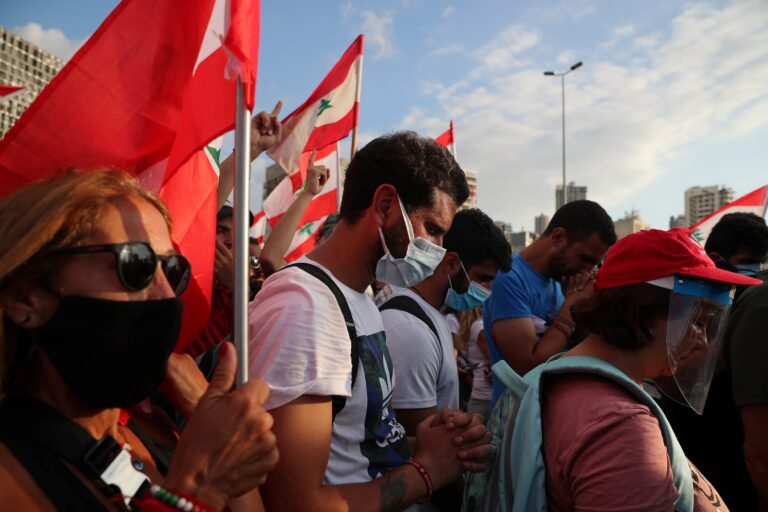AMMAN, Jordan (CNS) — Church bells and the Muslim call to prayer sounded Aug. 11 to mark a minute of silence for those who perished in the explosion devastating much of Beirut and its port a week earlier.
The port, badly damaged by a deadly explosion of 2,750 tons of ammonium nitrate, resumed partial operations.
But the same cannot be said for the many in Beirut suffering wounds from flying glass and trauma and others trying to pick up the pieces of destroyed homes, businesses and livelihoods. Some 300,000 people have been left homeless and more than 160 have been killed in the massive blast.
The Daughters of Charity of St. Vincent de Paul reported that one of their members, Sister Sophie Khosrovian, died from her injuries. Beirut is the order’s provincial center for the Middle East, and it is located less than a mile from the site of the blast.
An Aug. 8 post on the Vincentian Facebook page said: “All the premises of the Vincentians have been devastated: The provincial house is no longer livable, but we have started to clear the rubble and young people from the different Vincentian groups are helping us with this task. The warehouse of food stored for distribution to nearly 500 families has been blown up. The house, which used to receive students and low-paid employees, requires major repairs in order to resume its mission at a time when many families have lost their homes and could have taken advantage of these premises to take refuge there. The Basilica of the Miraculous Medal was damaged.
“The stained-glass windows are crumbling, the electrical system burned out, and we narrowly escaped a devastating fire. The rosary and the Mass that we used to celebrate there every evening, sometimes in the presence of more than 700 people, are now held outside, taking advantage of the good weather despite the summer heat. The premises of the oratory, which was attended by about 200 children from poor neighborhoods, have also been damaged.”
The blast badly damaged several neighborhoods in East Beirut where mainly Christians reside.
Analysts said the explosion and its aftermath could harm continued support for the Patriot Front Movement, whose leader, Michel Aoun, is Lebanon’s president, a post traditionally held by a Maronite Catholic.
Caritas Lebanon has so far aided 35,000 Lebanese affected by the tragedy, providing medical and psychological support, despite its own offices being damaged.
The agency opened tents in strategic areas of Beirut “to reach out to the biggest number of people in need,” and its army of volunteers is also going door-to-door to ensure that “help is delivered to people really in need,” said Caritas Lebanon director Rita Rhayem.
Rhayem explained that “being present for more than 40 years in Lebanon means everyone knows Caritas Lebanon.” She added that “many people are phoning us on our hotline. Someone will also call and tell us that our neighbor is in need, please go there.”
Clemens Mirbach, Malteser International’s coordinator for Lebanon, said that while physical wounds have been treated, “the catastrophe and the sudden loss of basic security have done extensive damage to the mental health of people affected.” The group is the relief agency of the Sovereign Order of Malta.
“Many patients have asked us for sedatives to get over the next 24 hours. A specialist will be deployed to Lebanon in the coming days to help provide psychosocial care for trauma victims,” Mirbach said of the continuing psychological toll on blast victims.
“Many people do not want to leave their homes out of security concerns,” said Mirbach. “Volunteers are handing out food packages, visiting vulnerable people and bringing them essential supplies. They also continue to assist in the cleanup efforts,” he added.
The powerful explosion damaged buildings across a wide swath of the city, leaving many homes without windows or doors.
Along the streets of Gemmayzeh and Mar Mikhael, two of the capital’s most popular districts, young Lebanese, some strangers to one another, were working to lift the residents’ spirits and clean up the rubble.
A young voice called up to Rose, a 90-year-old women and longtime resident of Gemmayzeh, who lives alone in her partially destroyed house, asking if she needed any help.
“You are giving me hope,” she answered. “During the civil war I have seen brothers separated by politics and neighbors shooting at each other, which can result in frustration and the loss of the will to go on,” Rose told a reporter.
“But when you see the humanity that still exists in so many Lebanese, it gives you a reason to keep on living.”
By:
Catholic News Service






